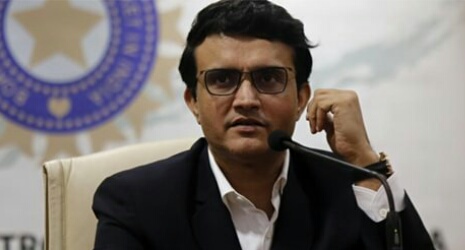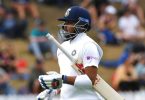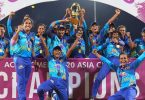There is a certain symmetry to Sourav Ganguly’s appointment as BCCI president. Ganguly took the reins of the Indian team following the match-fixing scandal that rocked Indian cricket, and now, 19 years later, he is leading the board following the Lodha reforms that roiled Indian cricket administration, and which were a result of the IPL spot-fixing and betting scandal.
Clearly, Ganguly is Indian cricket’s man for a crisis.
Though Ganguly is limited to a 10-month term before he has to take a three-year cooling off period under the new BCCI constitution, it is a situation Ganguly no doubt relishes.
“He likes to be influential, to deal with power,” Ayaz Menon, the veteran journalist, told Cricket Age. “He likes to be in the thick of things.”
No cricketer of Ganguly’s stature and accomplishment has been president before and his experience as captain should also stand him in good stead, said Dilip Vengsarkar, a former India captain who has also been an administrator with the Mumbai Cricket Association.
“Man-management is very important and Sourav is very good at that. He was a very successful captain for India. He backed the players he believed in and they delivered. Because he has a cricketing background, he will take cricketing decisions and that will help Indian cricket go further. From age-group to first-class cricket, he will do a good job” said Vengsarkar.
Ganguly has also spent the last five years as secretary and president of the Cricket Association of Bengal (CAB), so he understands how the board works. At 47, he is one of the youngest presidents ever but has proven adept at navigating the labyrinth corridors of the board. “He is very sharp. He has a strong antenna and picks up things very quickly,” Menon said.
However, it is the manner of his ascension to the top post that has set off furious speculation about whether he will join the BJP after his time as president ends with an eye on the West Bengal elections in 2021.
Ganguly was not the front-runner for the post. Brijesh Patel, another former India cricketer, and long-time administrator with the Karnataka State Cricket Association, had the backing of N Srinivasan, the influential former board president. Jay Shah, home minister Amit Shah’s son, was also reportedly in the fray. It was only after Ganguly met with Amit Shah on 13 October that Ganguly became the consensus candidate.
While Shah and Ganguly have both said they did not discus the politics, the optics of the meeting and the BJP’s subsequent support for Ganguly, make the possibility impossible to ignore. That Jay Shah the new secretary and BJP minister Anurag Thakur’s brother Arun Dhumal the new treasurer indicates that the BJP is in control of yet another institution.
“It is very obvious that it is a political appointment,” says Sanjay Jha, the founder of CricketNext, a spokesperson for the Congress, and a Ganguly fan. “The fact that he met Amit Shah and that there are lots of people from the BJP in top positions, it’s basically to send out the message that Sourav, if not overtly, is politically soft on the BJP.”
Ganguly is arguably as beloved in Bengal as Sachin Tendulkar is in Maharashtra. All the political parties in the state have at one time or another wanted a piece of his halo. Ganguly has been on good terms with current chief minister Mamata Banergee and her predecessor, the late Jyothi Basu, whom Ganguly once called a guardian of Bengal.
This is not the first time Ganguly, cricket administration and politics have mixed either. After then-CAB president Jagmohan Dalmiya died in 2015, it was Banerjee who publicly announced that Ganguly would be the new CAB president. At the time, Ganguly had been joint-secretary of the association for little more than a year. Yet, he has managed to stay politically uncommitted.
It’s not even the first time the BJP has wooed him. Prior to the 2014 Lok Sabha elections, it was reported that the BJP was hoping to convince him to run on their party ticket and according to The Economic Times, he was even offered his pick of constituencies. But after meeting Banerjee in January that year, Ganguly announced to the press that “I am not willing to join politics. Rather, I prefer to stay in the world of sports and this is my area of operation.”
Of course, much has changed since then in politics and the BCCI. The BJP are not only entrenched in the Centre, they are the second largest party in West Bengal. And the BCCI has spent the last three years run by a temporary committee set up by the Supreme Court. “The BCCI was in a complete mess as far as administration was concerned,” Vengsarkar said.
Niranjan Shan, the long-time cricket administrator from Saurashtra, and a former secretary of the Board, said the choice of Ganguly was a collective one while Patel was persuaded to accept the position of Chairman of the IPL. “This is not a question of any political thing. This is purely two great cricketers wanting the same post. Discussion is always there. You have to settle somewhere. It is all amicable. There is nothing like groupism [in the board].”
It’s easy to see why the BCCI is better off with Ganguly at the helm. His reputation and stature give the board a much-needed sheen and he has none of the baggage that long-standing BCCI officials carry.
“BCCI politics is about you scratch my back and I’ll scratch yours,” Menon says. “It is a brotherhood. For them it is very important to present a united front. If someone else was heading the BCCI, they would have faced many more questions.”







